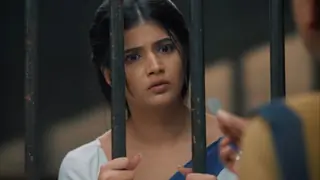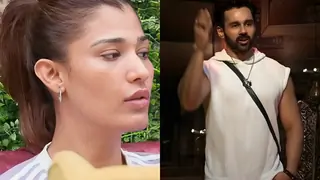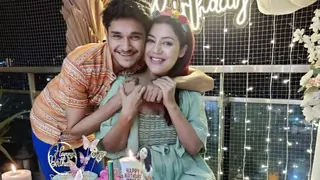| SD Burman: A giant's century |
| By Screen Weekly, |
| On October 1, 1906, a prince was born in the royal clan of Tripura in West Bengal. Today S D Burman, who along with his music will always remain young at heart, has crossed a century. Yes, Sachin Dev Burman, also known as Dada Burman or Burmanda, still lives, and a mere century from now, the man will touch a sprightly 200! His melodies seemed -without being revolutionary in content or packaging like son Rahul Dev Burman's - always ahead of their times. Yet they were also timeless. They defied convention often, and yet never sounded esoteric. They had immense mass-appeal, and yet they had rare elegance and class. The S.D.Burman song never sounded dated because it was too simple to be affected by changes in trends or passing fads. And simple art that resonates with everyone is always what a classic is about, for it is actually the most difficult to create! As a person and a composer, Dada Burman had several standout qualities. The blue-blooded Burmanda never compromised on work - and so he never ever broke certain rules he had set for himself. Much has been made about Dada's fixation with anyone coming to sign him for a film: it is said that he would refuse a producer whose face he did not like, and tell him so. But this was neither arrogance nor an excuse to back off - a combination of his life's circumstances and basic intelligence had probably taught him to judge character and temperament well, and Dada could instinctively set apart the proposal-makers from those wanted a quality composer like him! For did he not work with the best and finest names from Dev, Vijay and Chetan Anand to Guru Dutt, Bimal Roy, Hrishikesh Mukherjee, S.Mukerji and Shakti Samanta among many others? And what was this life we are talking about? Born in Comilla near Dhaka in undivided India, Burman Dada was the youngest of Nabadip Chandra Dev Burman's nine children. Nabadip Chandra was the direct heir to the kingdom of Tripura, but manipulative relatives forced him to relinquish the right. An adept at dhrupad and a master of the sitar, he gave Dada the first musical impetus along with Dada's elder brother Kiran Kumar, an army officer. The old family servant Madhav who would sing passages from the Ramayan and Anwar, the young Dada's angling partner who would sing Bhatiali, a Bangla folk song and play the Do-Tara, a 2-string folk instrument, also led to an enhanced interest in the young Dada in matters musical. Dada's mastery later encompassed the flute and the tabla. A saga fraught with intrigue is also said to have happened in Dada's early life. Legend has it that his fathe r sent him away because there were plans to poison his son, and that is when Dada roamed the forests of Bengal and Assam, interacting with sadhus and folk singers and getting his rich base of folk music and mountain raags as well as first-hand experiences of a life as removed from royalty as his guru K.C.Dey's music is from today's fusion. Dada passed his Intermediate examinations, equivalent to today's Std. XII, and completed his Bachelors in Arts from Comilla Victoria College at the very young age of 18. He left for Kolkata to pursue his M.A. in English. But music beckoned and he groomed in music instead from K.C.Dey (Manna Dey's uncle), Ustad Badal Khan, Ustad Allauddin Khan and Ustad Bishwadev Chatterjee. Dada made his debut for All-India Radio around 1927 and cut his first disc, as both singer and composer in 1932 with the now-defunct Hindoostan Records - a semi-classical and a folk number made up this 'double' 78 rpm LP. With its success and many others (he even sang playback in the Kolkata-made Hindi film Seeta in 1936) , he soon became Bengal's highest-paid singer, besides composing for several Bengali plays and films. Rajgee (1937) was Dada's first film. On stage, Dada performed with the likes of Ustad Abdul Karim Khan, Ustad Faiyyaz Khan and Girija Shankar Chakrabarty in major musical conferences in Allahabad and Kolkata. He married Meera, a singer and dancer in 1938 and came to Mumbai in 1944 on the invitation of studio baron S.Mukerji of Filmistan and made his debut with two 1946 films Eight Days and Shikari. But the Hindi film industry did not exactly welcome the man despite some popular songs in these films as well as Do Bhai ('Mera sundar sapna beet gaya...'), Vidya ('Bahe na kabhi nain se neer...'), and Shabnam ('Yeh duniya...'). Dada decided to move back to Kolkata, but Ashok Kumar, an admirer and then a partner in Filmistan, insisted that he complete their production Mashal. With this 1950 hit and Manna Dey's breakthrough 'Oopar gagan vishal...' Dada's destiny turned. Afsar, Baazi, Sazaa, Buzdil, Bahar and Naujawan constituted the 1951 flood that did not merely establish Dada in Mumbai but also consolidated his status as one of Hindi cinema's greatest-ever composers. Dada's passion for music and his pride in his own work were never polluted by a wish to cultivate lobbies and self-promotion. He knew his job, had the right approach and attitude, and cared a hoot for conforming to trends or rules that did not suit him. At this point let us examine his standout qualities that made him the Czar of Conviction in Hindi film music. Quality, not quantity: Once he established himself, Dada rarely took on more than 5 films at a time. But this was not out of some holier-than-thou self-proclamations of being an artiste first. It was just that Dada could not take on more, because he was convinced that no song of his should give any listener a dj vu feeling of any of his past songs, a common failing with almost every other music director in Hindi films! This is the reason why Dada Burman would admonish his son Rahul Dev Burman, not to take on so many films. "Forget a song, consciously and completely, once it is recorded," he advised him once. "That way, it's influences will not come into any later songs." Positive thinking: A combination of Dada's education, upbringing and earlier adversities gave Burman Sr. the asset of clear vision and maturity. He always thought positive, and this is where in his absence, his son Pancham could not psychologically cope when producers began to sideline him from the late '70s. Even more important, Dada's pedigree and this mindset made his approach exemplary in changing times. Unlike his contemporaries (some of whom had even assisted him and were thus juniors), Dada never badmouthed his juniors or denigrated trends and changes. He never got frustrated and wallowed in self-pity or gave interviews to whet the pens of interested journalists on how musical tastes had fallen and how music had changed for the worse. That is why in the last six years of his life he was right up there, competing with his son R.D.Burman and the latter's contemporaries Laxmikant-Pyarelal and Kalyanji-Anandji and giving chartbusters in films like Prem Pujari, Talash, Gambler, Tere Mere Sapne, Sharmeelee, Yeh Gulistan Hamara, Anuraag, Jugnu, Abhimaan, Premnagar, Chupke Chupke and Mili! And Dada paid the price - because his frustrated contemporaries accused him of monopolistic practices jointly with his son and the two duos! Perfection guaranteed: And yet if S.D.Burman remained at the top till the very end, it was also because of his yen for perfection. Dev Anand recalls how 'Honthon pe aisi baat...', which Dada refused to record till an authentic drum from Nepal reached Mumbai, was readied on trust after the unit reached Nepal for shooting. Similarly, the recording of 'Naache man mora...' from Meri Soorat Teri Aankhen was postponed until the arrival of Pandit Samta Prasad from Banaras. Dada also contested Dev's opinion that a tune for 'Din dhal jaaye...' (Guide) was not up to the mark, only to recapitulate the next morning and come up with the timeless tune we all love to this day. Innovation: Dada barely had the time to discover new talent, but he did shape existing playback singers in a significant way. Asha Bhosle owed a lot of her distinctive singing to Dada bang in the midst of her evolution under O.P.Nayyar. Kishore Kumar was a top favourite with him when others took him only sporadically. Mohammed Rafi, known then for earthy songs and plaintive litanies, was given the soft, sophisticated crooner image by Dada in so many of his films from Kala Bazar, Pyaasa and Kagaz Ke Phool all the way to Gambler in 1971. And only Dada could have used Kishore Kumar for Raj Kapoor and Dilip Kumar, and Mukesh and Manna Dey for Dev Anand! Dada also changed the convention of having lyrics being always composed by the music directors. Partly due to his (earlier) poor grasp of Hindi, he would in most cases insist on the tune coming first, and lyrics being written later. This trend was later followed by Shankar Jaikishan and most other composers and accounts for 80% of today's film songs! It was because of this that Dada could offer a slew of tunes for a single situation and make the producer choose the best! Obviously therefore, Dada was much more prolific than what seems to be the case from his limited number of films, though his leisured pace of working even led to his once offering to compose music for a sports event because he loved sports of many kinds! Probably the only significant debut under his music direction was character artiste Danny Denzongpa, who sang 'Mera naam Aao...' for Johnny Walker in Yeh Gulistan Hamara with Lata Mangeshkar. Needless to say, the song was a huge hit! Dev Anand and Youth: Mention Dev Anand, and the first associate that springs to mind is neither any heroine nor any filmmaker but S.D.Burman. As the actor told Screen some years ago, "Dada was humble, confident, accessible, generous, temperamental and whimsical, sometimes stubborn for a while. I revere, I admire, I loved Dada Burman! He was a pillar of my banner Navketan." S.D.Burman had a natural affinity for progressive people who were young in thought. His creative canvas was luxuriously wide, despite his penchant for personal austerity in lifestyle despite a royal origin. He would dump associates who were inclined to excessive chest-thumping (like Sahir Ludhianvi despite all his genius, and a few others whose thoughts remain shackled by various leanings and complexes) and opt for those who looked ahead, like Dev and Vijay Anand, Majrooh Sultanpuri, Shailendra and later Anand Bakshi. No one has ever heard a boring or a dated S.D.Burman song, and even in the millennium, we have had remixes of 'Saiyyan dil mein aana re...' which he composed for Bahar 55 years ago! We can thus round off this tribute by enumerating just a few of the 'youngest' compositions Dada ever made - 'Tadbeer se bigdi hui...' (Baazi /Geeta Dutt/1951), 'Jeevan ke safar mein rahi...'(Munimji /Kishore Kumar/1955), 'Jaane kya toone kahi...(Pyaasa/ Geeta Dutt/ 1957), 'Aankhon mein kya ji...' (Paying Guest/ Kishore-Asha/1958), 'Koi aaya dhadkan kehti hai...' (Lajwanti /Asha Bhosle/1958), 'Hai apna dil to awara...' (Jaal/ Hemant Kumar/1958), 'Khoya khoya chand...' (Kaala Bazaar/ Mohammed Rafi/1960), 'Dil ka bhanwar...' (Tere Ghar Ke Saamne/ Mohammed Rafi/1963), 'Raat akeli hai...' (Jewel Thief/Asha Bhosle/1967) and so many others. Note how each one of these seemed to be a product of the next decade from the one to which they actually belong! The S.D.Burman record will always play on, and a young century is just a new beginning. |



























